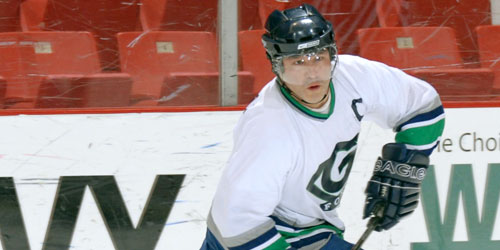
This fall's epidemic of gay youth suicides shocked and saddened millions of Americans. Dan Savage's "It Gets Better" video project provided hope to young people struggling with their sexual orientation; LGBT men and women told inspiring stories of their own lives, while leaders, including President Obama, added their own voices of support.
The broad-based effort heartened Glenn Witman. But he also smiled in recognition: He was already leading a similar project, admittedly on a much smaller scale.
Witman is the founder, president and captain of the G-Force Hockey Club. A Denver-based non-profit organization, G-Force plays some mean hockey – and does a lot more. Demonstrating competitiveness, teamwork, pride and courage on the ice, they break down negative stereotypes about gay athletes.
From the start, G-Force wanted young, gay hockey players to know about the team – and, by extension, to realize that they were not alone. Witman's e-mail and phone number were on the Internet. Young athletes were encouraged to call him for information and help – and they did.
For many reasons, gay athletes may have a harder time coming out than other youths. It can take longer, too. A 23-year-old player from Minnesota called. He was so closeted, Witman recalls, "he couldn't even say the word 'gay.'" Witman recounted his own story – he did not come out until he was 28 – and put the young man in touch with G-Force's goalie, who was not fully out.
The Minnesotan responded soon: "Thank you. You changed my life!"
Now, G-Force is institutionalizing its support program. They call it the Athletic Buddy System (ABS). Anyone wanting help in coming out to teammates, coaches, family or friends – or just needing someone to talk to – can contact [email protected] or call 303-808-1116. They'll be paired with a G-Force player, of whom there are many.
"Nearly everyone on the team wants to help," Witman notes.
One of those helpers is Ben Gardent. He got involved because he had not come out until age 24 – in part because he had no gay athletes as role models. His message: "No matter how difficult things may be now, they get a whole lot better when you're older."
Adam Mills looks forward to speaking with young gay athletes – but he says he may have to wait a while. Coming out where he lives – Nashville – is not easy. "I will tell people my journey and the rollercoaster ride of my athletic career," Mills says.
"Dealing with the uneasy feeling of being gay and on a sports team can be overwhelming. It can affect an athlete's performance, as well as academics. Having someone who understands what an athlete goes through can be the difference between life and death."
ABS is not G-Force's only project. The team is also working on another effort aimed at young athletes. Called an "athletic safety and respect policy," it's an agreement between G-Force and a university or sports organization. The latter agrees to support only those activities that are "constructive, educational, inspirational, and that contribute to the intellectual and personal development of students."
The policy includes sanctions for violations. These include probation and suspension of athletes and coaches – even cancellations of games.
G-Force will provide diversity training before the season to programs wishing to implement such a policy.
One such session was held in October at the University of Toronto. The goal was to create a dialogue between out athletes and other players, students, coaches and support staff.
Panelists Andrew Goldstein (a G-Force player better known for his All-American lacrosse achievements at Dartmouth College), David Farber (University of Pennsylvania) and Blake Anderson (Central Hockey League) shared personal stories.
"Some of the main points were that everyone has a different experience, but the general language in a locker room is a big problem in sports," Goldstein says. "Upon coming out we found that our coaches were sometimes big allies who wanted to be mentors/educators and do the right thing to protect their athletes and create a supportive environment."
Goldstein also notes that "in general, we should give our teammates more credit to change. Although they may denigrate gays in the locker room, they don't generally mean harm by it. Once they're more aware that their words hurt a teammate, they can change dramatically."
Though Goldstein felt the audience reaction in Toronto was very positive, he knows that "these sessions tend to attract those with similar views. We need to make sure the message reaches all types of people, including those who never consider gays in sports an issue or a reality."
G-Force's next step, he says, is to speak in high schools and to youth programs, reaching younger closeted athletes and their straight teammates and coaches. Then, perhaps, a program like ABS would no longer be needed.
For more information, visit www.gforcehockey.com.










